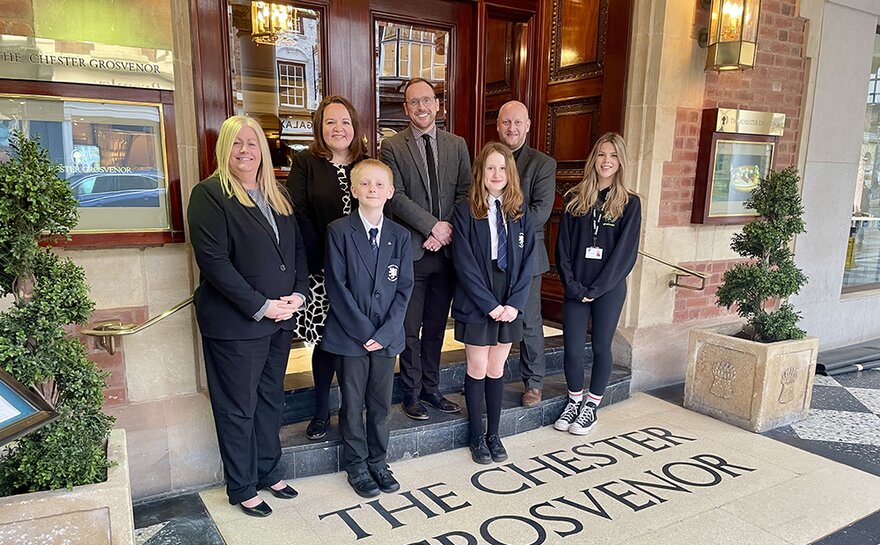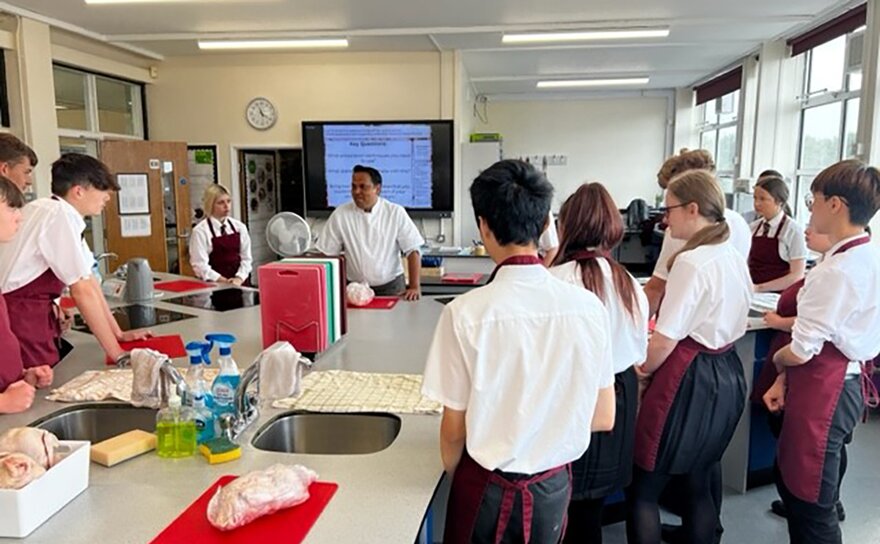Adrian Ellis of the Lowry is teaching the next generation about hospitality with the Schools and Hotels Liaison Programme
Adrian Ellis, general manager of the five-star Lowry hotel in Manchester and chair of the Manchester Hotel Association, has made it his mission to encourage more young people to choose hospitality as a career and to solve future retention and recruitment issues.
One of his boldest initiatives is the Hospitality and Schools Liaison Programme, which has now attracted the backing of UKHospitality and the Savoy Educational Trust.
It launched two years ago when he worked with Jason Benn, industry manager at skills development organisation City & Guilds, to set about creating a platform for hoteliers to incentivise 14- to 16-year-old schoolchildren to consider hospitality and build a pipeline into colleges and through to the industry.
The Lowry hotel kicked off the programme in Manchester by partnering with Lowry Academy. Ellis explains: "By teaming up with schools, hotels can show pupils the opportunities a hospitality career can offer. Pupils visit different departments in the hotels, enjoy fun cookery demonstrations, bedmaking competitions, wedding booking workshops and so on. Many pupils were astounded that we had 14 departments at the Lowry. The hotel teams visit the schools, too, and meetings are held with parents to gain their support."
Ellis, who sees this as a long-term initiative, says that in year one the programme signed up 20 schools and hotels. This rose to 35 in year two –more than a 50% increase – and as the programme enters its third year, he is confident many more will join: "We've made great progress, and have good relations with the schools and have got students enthused, so we're hoping they will sign up for hospitality courses in local colleges," he says. "Last year, 60 students in Manchester signed up for higher education hospitality-related courses. This year it will be higher at around 100."
The next part of the journey is to expand across the UK. Hotels in London, Cornwall, Chester and Liverpool are already up and running, with hotels in the Lake District and Newcastle on board in this new school year. Ellis says there are "good intentions" in Bristol, Leeds, Sheffield and Birmingham and other regions are now in discussion, such as the Hotel Federation of Northern Ireland.
The initiative is gaining traction and attracting high-profile supporters. UKHospitality is printing newsletters and a welcome pack to guide interested hoteliers, as well as launching a website page embedded into the schools programme section of its website. This website will act as a resource library, where hoteliers can find helpful advice on how to link with schools and colleges, ideas for class activities and so on.
The Savoy Educational Trust has also pledged a two-year grant to assist with the national roll-out of the programme. Indeed, Ellis has already recruited a hotels and schools liaison manager, who will start on 1 November.
Angela Maher, chief executive of the trust, says: "Educating secondary school pupils, and their parents and teachers, about the wide range of career opportunities available in the hospitality industry is so important in maintaining a strong talent pipeline for the sector. It is wonderful to see how much enthusiasm there is from other hotelier associations around the UK to engage with the programme, and the trustees believe this project could be the much-needed catalyst for making hospitality a career of first choice for so many more young people."
Case study: Savvy Hotels helping those with educational needs
Leisure operator Savvy Hotels is already seeing the potential of the liaison programme having started working with three special educational needs (SEN) schools – Dorin Park, Upton Lodge; Dee Banks School; and Maple Grove School – at its 20-bedroom Townhouse hotel in Chester in April 2023.
"We have over many years tried to work with schools, colleges and universities, and always found schools tough to get into, so this new programme has been amazing and the relationships are growing strong," says the group's chief executive Steven Hesketh.
The fact that they are SEN schools means the hotel tends to work with smaller groups of about eight pupils, devising tailormade activities.
At Dee Banks, for instance, the hotel team worked with students to review their own café, talking them through the customer journey.
At Dorin Park, they support IT lessons with discussions around everything from booking processes through to TripAdvisor interaction, as well as initiating fun activities such as showing them how to fold napkins and towels to create swans and elephants.
At Maple Grove, the team has helped at a planned student career day by taking the students through mock interviews and giving them an introduction to hotel roles. They used pictures of individuals in uniform and described their daily tasks to show the breadth of opportunities available.
With SEN schools there can be more logistics in taking pupils off the premises to visit the hotels, so all of the events have been on school property.
"This has worked fine, and our team have simply prepped accordingly to deliver to the small groups. Most of what we are doing is engagement and communication," says Hesketh, who says the benefits work both ways.
"For us, working with SEN children has been almost more rewarding for our team members, as we are seeing students who have their challenges become really engaged and excited at the opportunities."
As Hesketh's team only started the programme in April, this has been more of an introduction for both sides. But it has proved so positive that more is being planned for the new school year, including some introductory onsite work experience for those students who are ready for this level of interaction.
As chair of Chester Hospitality Association and vice-chair of Liverpool Hospitality Association, Hesketh is excited about extending the initiative and has encouraged 30 other hotel properties across the two cities to start the Hotel and Schools Liaison Programme.
"We can learn from the other partnerships now under way in cities such as Manchester, and as we get more data and feedback on what is successful in creating work experiences and employment opportunities, we can tailor what works best to our hotels and schools in Chester and Liverpool," says Hesketh.
Case study: Millennium & Copthorne Hotels offers practical experience
This four-star 231-bedroom hotel at Chelsea Football Club's Stamford Bridge ground was one of the first hospitality businesses to commit to the London Living Wage and to sign up to the Hoteliers' Charter. And since 2021 has been consistently recognised as one of The Caterer's Top 30 Best Places to Work in Hospitality. Yet, for all this, recruitment was still an issue.
"I was determined to do something meaningful to address recruitment and the perception of our industry while learning more about the [local] community," says general manager Mark Gregory-White. He linked up with the Chelsea Foundation, which works to improve social inclusion and careers engagement, and also became an enterprise adviser at the West London Careers Hub, which links businesses to schools and colleges. Through them, he became involved with the Queensmill Trust, which supports special education settings in west London that specialise in autism and related education needs.
"Keen to demonstrate that our industry has potential for all, I was delighted that we were able to work with a population that offers so much but is so under-represented across all workplaces," says Gregory-White.
Queensmill helps the hotel to work with secondary school or post-secondary intern groups, while the foundation links the hotel with secondary schools.
For instance, recently the foundation organised a "Day in the life of…" for Year 10 students to show them how days vary in hotels and what skills are needed in different roles.
Other initiatives include inviting 10 supported interns from Queensmill for a "breakfast and learn" session at the hotel, allowing them to enjoy the restaurant experience while discussing the planning that goes into a breakfast service. The hotel's chefs have also conducted a "show and tell" session at a Queensmill school, making choux buns with students, while a group of 30 Year 9 pupils visited the hotel for a bed-making, vacuuming and table-laying competition.
Engaging with youngsters requires some planning so the hotel team work closely with foundation lead workers and the hub's careers co-ordinator.
"In order for the events to be successful for the school there have to be pre-set objectives as to what each activity will achieve. This is done by aligning ourselves and all we do to the eight Gatsby career benchmarks. This keeps us focused and ensures the time is well spent for all parties," says Gregory-White.
As for how he measures the success of the programme, Gregory-White says: "For us, [it] comes from transforming perceptions and bringing new experiences. On being introduced to our hotel, one young man revealed that, to date, his only experience of a hotel had been as emergency B&B accommodation. With that as his reference point, he would surely never have considered our industry for his career. For another younger student, there was the obvious joy in tasting and getting elbow-deep in chocolate sprinkles while seeing close-up the skill of our chefs."
He adds that an unexpected benefit has been the pleasure and personal growth of the team members involved, as great thought has had to be given to making the activities meaningful and engaging.
"We've reminded ourselves of the pride we should take in what we do and who we work for, and how much we can do to make a difference, add value and better understand how we can engage with our community and inspire potential future team members," he says.
Case study: giving an all-round view of hotel life at Dakota Manchester
The Manchester Hoteliers' Association, chaired by Adrian Ellis, helped to put Dakota Hotel Manchester in touch with Swinton Co-op Academy in 2019.
"We'd always engaged with universities and colleges and so we wanted to take this opportunity to engage with schools," says regional operations director Matt Townley.
"We see an erosion of talent at middle management because they see it as a stop-gap job, so we want to build a pipeline of talent from school leavers through to upper management."
In year one, the hotel team focused on creating a presence. Head of engagement, learning and development Katie Forrest explains: "Initially, we invited the teachers into the hotel for lunch because we knew it was important to have their buy-in. We shared how we entered the industry and how beneficial relationships had been for us throughout our careers."
With the principal on board, enthusiasm fed down through the core of the school, which has helped to overcome the logistics of getting parent sign-offs and organising transport. While the hotel team visits the school bimonthly, the pupils only visit the hotel twice a year.
"At first, it was trial and error. We were seeing what students wanted, trying things out and rolling out what was successful," says Forrest. "We focus on things that make it real, such as health and safety, security in the workplace – things that are difficult to train in school."
The hotel visits take more planning. "There is a challenge for us when 40 kids turn up at the front door at 10am on a Monday – so we break them into smaller groups," says Townley.
The day starts with an open session where the team ask pupils to name the roles they know about in hospitality.
"It's always interesting to see the little moments of realisation when we talk about our facilities teams, social media teams or guest relations and concierge – you can really see the students thinking ‘Maybe I could do that'," says Forrest. "We also ask the slightly younger year groups what they want to be when they grow up and we get answers like ‘I want to be a plumber or mechanic', and so we tell them we have a maintenance department."
Townley adds: "They don't understand what else is going on behind the scenes in a hotel and so we open their eyes to the skills they can learn and the scope to transfer those skills." Inviting parents to sessions is key, too.
"We need to educate the educators and the parents because it is important they know there is a valid career in the hotel for their children," says Townley.
The programme has been so successful that Dakota has subsequently teamed up with a second school – Kingsway School in Cheadle.
"Ultimately, we are super-passionate about our industry and that people view us a career of choice," says Forrest. "It will benefit us down the line, but the reality is that there are young people who are not being provided with career options. We are saying in hospitality you can be treated fairly, have fun and experience development."
Get involved
Visit Hospitality and Schools Liaison Programme – UKHospitality
Contact your local hotel association or careers advisor for advice on partnerships in your area
Contact Adrian Ellis at the Lowry hotel on 0161 827 4000
Continue reading
You need to be a premium member to view this. Subscribe from just 99p per week.
Already subscribed? Log In












